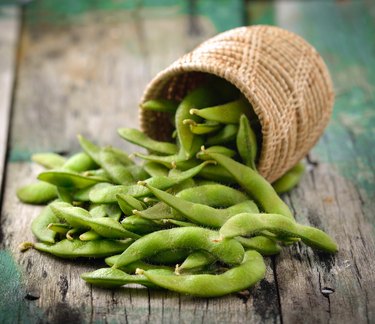
The male hormone, testosterone, is converted into dihydrotestosterone, or DHT, by an enzyme in the body called 5-alpha reductase, according to the University of Maryland Medical Center, or UMMC. The U.S. National Library of Medicine confirms that DHT plays a major role in male sexual development.
It is believed to be a key contributor in male baldness and acne vulgaris, the most common skin disorder. Some foods and vitamins may hinder the formation of DHT.
Video of the Day
Video of the Day
Contrary to outdated research indicating that elevated levels of DHT play a role in prostate cancer development, recent research in 2017 published in Endocrine Reviews shows there is no association between high DHT levels and prostate cancer.
Low Fat/High Fiber Foods
The mechanism behind a low fat and high fiber diet on decreasing DHT is not well understood. A 2005 study published in The "Journal of Clinical Endocrinology and Metabolism" found that men who switched from a high fat diet to a low fat, high fiber diet lowered their levels of DHT. Low fat, high fiber foods are fruits, vegetables, and whole grains.
Soy
Soy, a member of the pea family, has been a fixture in Asian diets for thousands of years, according to the National Center for Complementary and Alternative Medicine, or NCCAM. High-protein seeds from the soy plant contain estrogen-like compounds called isoflavones — and according to Dr. Ray Sahelian, soy also contains a molecule that prohibits the formation of DHT.
A 2015 study published in "Dermato Endocrinology" found that when soy was added to the diet, levels of DHT in the body decreased. Though believed beneficial for some conditions, you should consult your doctor before adding soy to your diet.
Phytosterols
Phytosterols, plant-derived sterols similar to human cholesterol, may reduce levels of DHT, according to the Linus Pauling Institute, or LPI. The diets of early humans contained many phytosterols; however, modern Western diets are said to be lacking in these beneficial sterols. The LPI reports that animal investigations suggest that a diet high in phytosterols may inhibit the enzyme, 5-alpha reductase and block the production of DHT.
You can obtain phytosterols through many common food sources, including wheat germ, sesame oil, corn oil, canola oil, peanuts, almonds, macadamia nuts, Brussels sprouts, olive oil and rye bread.
Flaxseed
Flaxseeds are one of the richest sources of substances called lignans, in the diet. Years of research suggest that lignans help pull excess testosterone out of the body. Lignans may help slow down the production of 5-alpha reductase and thus converting less testosterone to DHT according to 2007 research published in "Current Topics in Nutraceutical Research." Flaxseeds come in whole seeds, but they must be ground in order for the body to absorb the nutrients.
Potential Concerns
It is always important to speak with a health professional when considering to add or subtract foods from a daily diet to treat a condition. Certain foods have the potential to mix with medications and change their effectiveness.
- Ray Sahalian: Hair loss Supplements and Vitamins - Do They Work?
- Preventative Medicine and Nutrition: Soy and Health
- Prostate Cancer Foundation: Living with Prostate Cancer
- Linus Pauling Institute: Phytosterols
- National Center for Comlementary and Alternative Medicine: Soy
- Medline Plus: Biotin
- Linus Pauling Institute: Biotin
- Medical News Today: What Is DHT? What is its Role in Hair Loss?